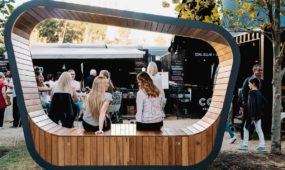The benefits of feeding wine to abalone
Innovation
SEAFOOD and wine have long been considered a culinary match. Now researchers have discovered recycled wine waste is excellent abalone feed.

Sign up to receive notifications about new stories in this category.
Thank you for subscribing to story notifications.
Lab trials in South Australia have shown that steamed grape marc product, a by-product of winemaking, not only out performed commercial aquaculture feeds for abalone growth, it was also about half the price.
During the three-month lab trial greenlip abalone fed on the experimental diet gained more weight, and grew bigger on less food than abalone on a commercial diet.
The experiment was conducted by the South Australian Research and Development Institute (SARDI) in partnership with Barossa Valley wine waste company Tarac Technologies.
The research has so far produced a cheaper, better performing food source made from what has generally been regarded as a waste product. It is also being considered as a potential food source for farmed fish.
SARDI Nutrition and Feed Technology Associate Professor David Stone said cereals such as wheat, lupins and soy were traditionally used as a carbohydrate and energy source in commercial abalone feed. He said the Acti-Meal had the potential to replace some of those ingredients.
“As we added the grape marc in we got a significant improvement in growth and feed utilisation and we are removing something that costs $500-$800 a tonne and replacing it with what is effectively a waste product that costs $250-$400 a tonne – it’s a price reduction with a growth benefit,” he said.
Assoc Prof Stone, pictured, said the feed containing Tarac’s steam distilled grape marc product could be commercially available in the second half of 2018 after farm trials planned for November.
He said one of the major challenges facing aquaculture was finding sustainable food sources that minimised the use of marine ingredients. Using a waste product such as steam distilled grape marc went part of the way to achieving this, Assoc Prof Stone said.
“You don’t want to be taking 2kg of fish from the ocean to produce 1kg of fish in a farm.”
Tarac Technologies, which makes Acti-Meal, produces about 130,000 tonnes of steam distilled grape marc a year from the heat-treated skins, pulp, seeds, and stems of grapes left over after wine is made.
The South Australian company is a world leader in turning grape marc, once known as a waste product, into a range of value added products ranging from grape spirit to stock feed, grape seed extract, grape seed oil and soil improvers.
Tarac Technologies CEO Jeremy Blanks said the Acti-Meal product was originally developed for agriculture as a feed source for cattle, sheep and pigs.
He said it was the first time he was aware of that wine industry bi-products had been used in aquaculture feed.
“Our byline is all about reuse, recycling, reformulating and revaluing – it’s all about trying to find better and more sustainable ways to reuse products out of the wine industry.”
“Finding ways to value add that bi-product and apply it into areas such as agriculture and aquaculture is something we’ve been looking at for a long time and this is starting to show some early positive signs.”
Jump to next article



